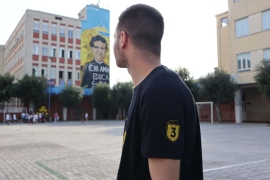Each year a theme is chosen for the day. This year, Pope Francis has chosen to entitle his annual message as “God walks with his people.” In his message, Pope Francis said, “God not only walks with his people, but also within them, in the sense that he identifies himself with men and women on their journey through history, particularly with the least, the poor and the marginalized.”
“Salesian missionaries are on the front lines helping migrants and refugees in their new countries to become acclimated and access the resources they need,” explained Father Michael Conway, director of Salesian Missions. “Salesians are there every step of the way — from teaching language skills and job skills, to helping migrants and refugees find housing and meeting their basic needs. Salesians also focus on education and workforce development programs to provide more opportunities for youth to remain in their home country instead of being forced to migrate for employment.”
To mark the Catholic celebration of World Day of Migrants and Refugees 2024, Salesian Missions is proud to highlight Salesian programs around the globe that provide life-changing education and social support to refugees and migrants.
EGYPT
Salesian missionaries in Egypt offered training to assist refugees in gaining the skills needed for employment or self-employment through the Sunrise Project for Cairo’s Urban Refugees and Vulnerable Hosts from 2014 to 2023. The project was possible thanks to funding Salesian Missions received from the U.S. Department of State’s Bureau of Population, Refugees and Migration (PRM). The project was facilitated through a Salesian technical and vocational training center in Cairo.
The project improved the livelihoods and quality of life of more than 3,000 Sub-Saharan African, Yemeni, and Syrian refugees, and vulnerable Egyptians. The popularity of the training grew throughout the years.
Follow-up with those who had received seed funding over three years as part of the project found that more than 65% of microenterprises were still operational after 12 months. Twenty-one percent of respondents said their income was sufficient to meet their household needs and 17% said they had enough to save.
The Sunrise Project team also developed a wider network of partners across to foster better outcomes for trainees. Among these were 24 companies and factories that were willing to employ refugees and guarantee their rights. This work was important for securing internships for trainees and employment after graduation.
INDIA
Salesian missionaries with Bosco Vikas Gramin Kendra were able to support children in migrant communities in the Central Maharashtra region of India thanks to funding from Salesian Missions.
The project encouraged children from the migrant communities to attend study centers for various sports activities. This brought youth in the door and allowed them to access the other services being offered, including classes. In six project hamlets, study classes were held on a regular basis. A total of 193 boys and girls were enrolled and studied math and language. At the conclusion of each month, tests were administered to assess progress. The monthly evaluations were then shared with the students. Special additional care and attention were provided to those who needed help.
Nutrition was also provided for 200 youth, who were able to have at least one healthy meal a week thanks to the project funding. Salesians also held programs to inform parents about the importance of healthy nutrition. Parents were able to attend sessions that informed them of other services available to them. Salesians covered 12 programs that parents could access including health insurance, financial aid and nutritional support. More than 2,300 people attended these sessions.
ITALY
The Don Bosco Center in Naples, Italy, is working to support young migrants who come to Italy looking for safety and better opportunities. Youth come to the country, most without parents, and land in the south before they make their way north in Italy and to the rest of Europe.
The Don Bosco Center is part of the Salesians for Social APS network and is the main point of contact for unaccompanied foreign minors who transit from Campania. The center has a reception community and a project aimed at promoting social and employment inclusion for those who are of age.
In six years, Father Giovanni Vanni, director, has seen nearly 800 youth arrive from as many as 37 different countries. “Many come from Tunisia, but in the last two years, the majority have come from Egypt. They follow a detailed itinerary from the start. They depart from Tobruk, which is the closest Libyan port to the border. While waiting for the boat, they are crammed into a shed. They do not suffer violence, but they are not free to leave. The average age has dropped too. A few days ago, we received a 14-year-old.”
MEXICO
Salesian Tijuana Project has been committed to the most vulnerable people, especially migrants and refugees, since 1987 in Tijuana, Mexico. The Salesian Center houses a refectory and other project activities and provides services to migrants and poor youth living on the border between Mexico and the United States.
Salesian Tijuana Project has youth centers, where cultural and sports activities are offered to children and older youth, both native to the city and migrants. In addition, there is a large Salesian Center that acts as a hub for migrants who, besides much-needed material help, are offered a familiar and welcoming environment. They can access haircuts, a change of clothes, a shower, and an opportunity to call and contact their families.
The Salesian Center also has a partnership with the Red Cross and local volunteer doctors who offer psychological and medical help. Nearly 1,500 are offered support through this center at any given time.
Source: Salesian Missions


